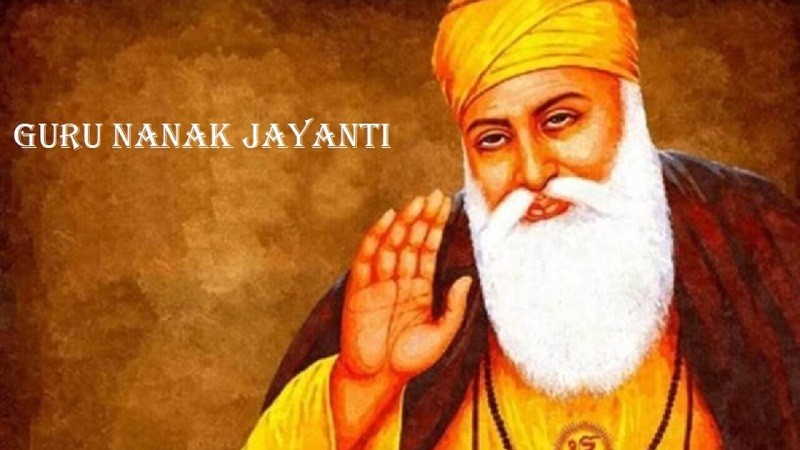
Guru Nanak Jayanti-Gurpurab 2022: Guru Nanak Jayanti is one of the most prominent Sikh festivals which is observed as the birthday of the first of their gurus, Guru Nanak. The founder of Sikhism, Guru Nanak played a key role in shaping and strengthening the Sikh community.
The anniversary of Guru Nanak's birth is commemorated, in accordance with Sikh scripture, on the full moon day of the Indian lunar month of Kartik. This day, which is also known as Gurpurab or Guru Nanak's Prakash Utsav, is enthusiastically observed by Sikhs all over the country.
Here's something you need to know about Gurpurab's significance and history: According to the traditional lunar calendar, the date of Gurpurab fluctuates from year to year. While Diwali is celebrated on the 15th day of the Kartik month, Guru Nanak Jayanti is celebrated fifteen days later on the auspicious festival of Kartik Purnima. Guru Nanak Dev's 553 birthday will be celebrated on November 8 this year.
A person's greatness is determined not only by the good deeds performed during his or her lifetime, but also by the influence of those deeds across centuries. Guru Nanak Dev was one of those outstanding persons who left an indelible mark on the Indian subcontinent. Guru Nanak Dev has been on our planet for 552 years. And, with each passing day, Guru Nanak's enormous grandeur grows, transcending national, geographic, religious, linguistic, and cultural borders.
Guru Nanak could be considered the forerunner of a new age in Indian civilisation. He was a powerful spiritual leader, yet his concerns were not limited to religious affairs. He was a wise person who could see things that science at the time couldn't. He had a dream for the betterment of society. He saw a vision of an endless number of celestial bodies in a galaxy, as well as millions of heavens, which most people could not even comprehend at the time. The earth, according to Guru Nanak, is built on the foundation of law, or dharma. Remember that dharma refers to a law, principle, or way of life in Indian culture. Religion isn't a literal translation of the English word. Guru Nanak could be said to have been laying the foundation for the Indian Renaissance.
Guru Nanak Dev was not a world-renouncing ascetic or an armchair philosopher. He advocated for karma as the foundation of dharma, and he changed spiritualism into a social duty and reform ideology. The abiding legacy of Guru Nanak's teaching is the principle of earning bread via honest labour and sharing the fruits of that labour with the society.
Guru Nanak warned people against using religion to gain material gain. He also spearheaded a sustained campaign against social inequity that stems from false pride, which is fueled by caste hierarchy. He developed a social responsibility ethic and attacked everything that appeared to be religion but was actually a ruse to exploit the weak. The basis of an ethical existence, according to Guru Nanak, is chanting god's name and having unwavering confidence in the way god works. Guru Nanak was not looking for a concept of truth that was complicated in metaphysical, philosophical, logical, or other ways. He valued a more straightforward definition of truth, one that served as the foundation for ethical behaviour. He said that the highest value in life is truth, but that living truthfully is even more valuable. Guru Nanak thereby bridged the gap between the concept and practise of truth. Guru Nanak's teachings on selfless service were very practical and applicable to the average person: he never preached anything that he did not live by.
Guru Nanak was also a tremendous traveller, possibly the world's most travelled saint. He not only travelled, but also held amicable dialogues with prominent leaders of other faiths. He attempted to comprehend their viewpoints before presenting his own vision of humanity. Shri Guru Granth Sahib gives an indication of the types of saints he would have encountered, and their opinions are prominently featured in the holy book.
In the mediaeval period, India was going through a critical period, and society was going through a lot of changes and imbalances. Guru Nanak had the foresight to say, "Na koi Hindu na Musalman," implying that we are all children of the same god. He emphasised three points: 1) "Work Hard, Earn Good Karma and an Honest Living," 2)"Not Be Selfish, Share with Others," 3) "Meditate and Remember the Name of God."
Guru Nanak's life, teachings, and writings are part of humanity's collective memory. A vast number of individuals around the world continue to follow his path of unity, equality, humility, and devotion to mankind. It is imperative that we remember Guru Nanak Devji and follow his teachings in order to achieve national unity and social harmony.
other evebnts of the day: